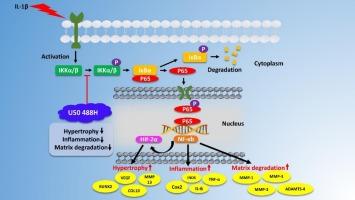u50488h KOR激动剂减少骨关节炎的软骨退化、软骨细胞肥大和骨质流失
IF 4.7
2区 医学
Q2 IMMUNOLOGY
引用次数: 0
摘要
骨关节炎是一种慢性关节疾病,引起明显的疼痛和不适,特别是在老年人中。它的特征是炎症、细胞外基质降解、软骨细胞凋亡、肥大和软骨下骨变性。在本研究中,我们探讨了Kappa阿片受体(KOR)激动剂U50 488H在骨关节炎体外和体内模型中的疾病修饰活性。U50 488H可减少大鼠关节软骨细胞中促炎因子的产生,降低活性氧(ROS)的产生,抑制IL-1β诱导的肥厚因子和分解代谢因子的表达。此外,U50 488H关节内注射可减缓前交叉韧带横断(ACLT)大鼠骨关节炎的进展。组织学结果显示,U50 488H保留了蛋白多糖含量、软骨厚度和软骨完整性。此外,显微ct软骨下骨分析表明,KOR激动剂保护骨微结构。总之,这些发现表明,在骨关节炎条件下,KOR信号具有软骨保护和骨保护作用。本文章由计算机程序翻译,如有差异,请以英文原文为准。

U50 488H KOR agonist reduces cartilage degradation, chondrocyte hypertrophy and bone loss in osteoarthritis
Osteoarthritis is a chronic joint disease-causing significant pain and discomfort especially in the aging population. It is characterized by inflammation, extracellular matrix degradation, chondrocyte apoptosis, hypertrophy and subchondral bone degeneration. In this study, we explored the disease modifying activity of Kappa Opioid Receptor (KOR) agonist U50 488H in in-vitro and in-vivo model of osteoarthritis. U50 488H reduced the production of pro-inflammatory cytokines, lowered reactive oxygen species (ROS) generation and inhibited the expression of hypertrophic and catabolic factors induced by IL-1β in rat articular chondrocytes. Additionally, the intra articular injection of U50 488H slowed the progression of osteoarthritis in anterior cruciate ligament transected (ACLT) rat model. Histological findings revealed that U50 488H preserved the proteoglycan content, cartilage thickness and cartilage integrity. Furthermore, subchondral bone analysis by micro-CT demonstrated that KOR agonist protected the bone microarchitecture. In conclusion, these findings suggest that KOR signalling has both chondroprotective and osteoprotective effects in osteoarthritic condition.
求助全文
通过发布文献求助,成功后即可免费获取论文全文。
去求助
来源期刊
CiteScore
8.40
自引率
3.60%
发文量
935
审稿时长
53 days
期刊介绍:
International Immunopharmacology is the primary vehicle for the publication of original research papers pertinent to the overlapping areas of immunology, pharmacology, cytokine biology, immunotherapy, immunopathology and immunotoxicology. Review articles that encompass these subjects are also welcome.
The subject material appropriate for submission includes:
• Clinical studies employing immunotherapy of any type including the use of: bacterial and chemical agents; thymic hormones, interferon, lymphokines, etc., in transplantation and diseases such as cancer, immunodeficiency, chronic infection and allergic, inflammatory or autoimmune disorders.
• Studies on the mechanisms of action of these agents for specific parameters of immune competence as well as the overall clinical state.
• Pre-clinical animal studies and in vitro studies on mechanisms of action with immunopotentiators, immunomodulators, immunoadjuvants and other pharmacological agents active on cells participating in immune or allergic responses.
• Pharmacological compounds, microbial products and toxicological agents that affect the lymphoid system, and their mechanisms of action.
• Agents that activate genes or modify transcription and translation within the immune response.
• Substances activated, generated, or released through immunologic or related pathways that are pharmacologically active.
• Production, function and regulation of cytokines and their receptors.
• Classical pharmacological studies on the effects of chemokines and bioactive factors released during immunological reactions.

 求助内容:
求助内容: 应助结果提醒方式:
应助结果提醒方式:


